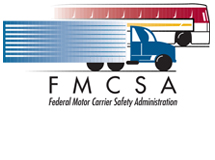 |
 |
|
| eNews • January 2012 | ||
| Promoting a Cost-Effective, Reliable and Competitive Transportation System |
||
 Federal Truck Regulators Issue Tougher Driver Rules
Federal Truck Regulators Issue Tougher Driver Rules
Federal safety regulators issued tougher new hours of service regulations for truck drivers on December 22 maintaining the 11-hour daily limit that shippers and carriers says is central to U.S. domestic supply chains but also creating tighter requirements for rest periods and total weekly time on the road.
The Federal Motor Carrier Safety Administration did not reduce the daily limit to 10 hours or less as logistics industry executives had feared, but the rule requires a 30-minute rest after eight consecutive hours of driving and it cuts the weekly total hours from the current 82 hours to 70.
The changes, the first in the core regulation covering truck driver fatigue since 2003, are the less dramatic than the original regulation the FMCSA had outlined in a preliminary notice. But it also redraws the so-called “34-hour restart” provision that resets driver work clocks to require rest periods at specific times and to reduce the overall work week.
“This final rule is the culmination of the most extensive and transparent public outreach effort in our agency’s history,” FMCSA Administrator Anne S. Ferro said in a statement. “With robust input from all areas of the trucking community, coupled with the latest scientific research, we carefully crafted a rule acknowledging that when truckers are rested, alert and focused on safety, it makes our roadways safer.”
The rule will take effect July 1, 2013, FMCSA said, giving trucking companies and their customers time to incorporate the changes in their work rules.
The American Trucking Associations has already signaled it would challenge a tougher HOS rule in court, saying statistics show highway safety has improved and trucking accidents involving fatigue have declined since the current regulation was implemented last decade.
The changes in the 34-hour restart in the final rule are not as extensive as described in the preliminary version but will require adjustments for drivers, companies and customers.
For instance, drivers who reach the 70-hour weekly limit will have to have two nights in which their time off includes the hours between 1 a.m. and 5 a.m. The earlier version had proposed extending that requirement to a full night, to 7 a.m., and to include a weekend night off. Industry officials said that would have put trucks on the road at the height of rush hour, forcing truckers to share already crowded highways with commuters.
The new rule also imposes tough new penalties for violations. Trucking companies that allow drivers to exceed the 11-hour driving limit by three or more hours could be fined $11,000 per offense, and the drivers could face civil penalties themselves of up to $2,750 for each offense.
Source: Journal of Commerce
Soy Transportation Coalition |
|
